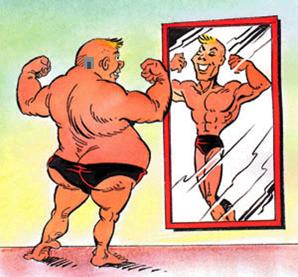
How many times have we come across dull people who
do they believe themselves to be the smartest individuals in the world? It is about
people who qualify themselves as belonging to the species "homo sapiens sapiens" and normally are
quite annoying since they take on a know-it-all attitude when
they actually show various gaps in the field of knowledge.
is defined in the psychological field as "Effect
Dunning-Kruger”And refers to those people who are particularly
ignorant but who are convinced otherwise. Indeed, they tend to consider themselves
much more intelligent and prepared than the rest of the mere mortals. This kind of false self perception was discovered in
1999 by Justin Kruger and David Dunning, professors at the University of
Cornell. Both researchers began by examining previous findings
studies in which it was suggested that ignorance sometimes gives more self-confidence
same as knowledge. Specifically, reference was made to some
activities such as driving, games such as chess or sports such as tennis. In this way, the researchers hypothesized that the
more incompetent people tend to overestimate their skills and are
highly unable to recognize their limitations. At the same time, these
people do not recognize the abilities of others, which makes them feel
superior. The good news lies in that when these people keep going
train by improving their skills, then they finally manage to recognize
the lack of skills they had before. To prove this hypothesis the researchers have
involved a group of Psychology students, who had to complete one
series of tests of logical thinking, grammar and humor. Later, i
researchers showed them the votes received and asked him what
assessed what position they might have reached in the general table.
Curiously, the most incompetent students were those who
they overestimated their position more. This experiment was repeated four times and
the same results have always been obtained. Speaking in statistical terms, the
students who, according to the score obtained, were ranked among the worst 12%
they self ranked among the top 62%. One of the most interesting aspects of this study
lies in the fact that students who believed themselves above average (also
if they were far below), they too showed a great inability in
recognize the superiority of others. In fact, when they were shown
the results of the brightest students, this did not change the image that
they had of themselves but rather strengthened it. The curious side was that who
had achieved the best score, tended to doubt his own results,
even when he was presented with the results of others. Later, in 2004, some University researchers
of Columbia, confirmed that the Dunning-Kruger effect doesn't just apply
to motor or intellectual skills but also to the level of competition
interpersonal and communication. Of course, there are also detractors of the effect
Dunning-Kruger, who claim that overestimating our abilities can be
psychological well-being index. Personally, I believe that everything has to be considered
in the right perspective. Knowing our potentials and weaknesses is
essential to determine a good strategy that allows us to realize i
our goals.


























